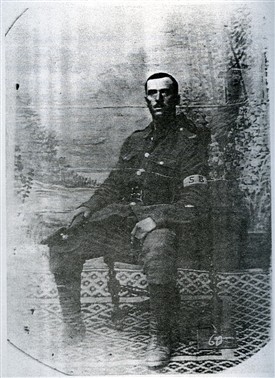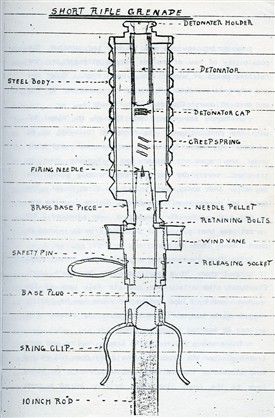HUNT, Walter (of Nottingham)

Walter Hunt

One of walter Hunt's drawings from his diary
King's Liverpool Regiment (The Pioneers)
Born 1885, Died 1964
Walter Hunt was born in 1885 and in 1911 married Sarah Beecroft, one of a family of twelve. They lived in Nottingham , where, by the outbreak of the Great War, they had had two children.
Walter, an auctioneer and valuer by trade, volunteered in 1916 and, despite being colour-blind, was passed 'A1' for duty.
Military Service
Deposited at Nottinghamshire Archives (DD299/1-2) are three diaries written by Hunt during his war service (1916-1918) and it is from these that Nicholas Clark compiled a chapter in his most informative book ‘Sunken Roads: Memories of the Great War’ (Nottingham: Erran publishing, 1989). The following notes are taken from Mr. Clark’s book by permission.
The first entries begin as Hunt arrives at training camp, the location of which is, unfortunately, not recorded in the diaries.
His stay at training camp was apparently quite brief, and he was soon mobilised to France. He and his fellow recruits travelled by paddle steamer from Folkestone to Boulogne and thence to a camp at Etaples, arriving on the afternoon of Wednesday 13th December 1916 to be issued with the equipment they would need for life in the trenches. A further train journey took him and his regiment to the region of Bordeaux where he was to receive his baptism of trench warfare.
Over Christmas and the winter months activity was muted, but with the arrival of better weather around Easter 1917 the possibility of offensive action increased. In March came the order to ‘stand to’ with the possibility of the regiment following up an advance. By early April the war was well and truly underway again.
"Keeping down in trenches... Lovely day and guns continuously going"
“Easter Day”, wrote Hunt, “keeping down in trenches…lovely day and guns continuously going”. The day after that entry Hunt joined his first ‘push’. His diary entry for Monday 9th April 1917 reads “Going over the top. It was a grand day for our attack…we advanced 2,700 yards”. He then lists his friends injured or dead – 23 in all.
This first day of the ‘push’ was not particularly glorious for Hunt. He spent it pinned down in a shell-hole in ‘No-Man’s Land’, and eventually the attack was ordered to fall back to the ‘sunken road’ by 8:30pm . This ended Hunt’s first experience of going over the top.
In subsequent days he worked briefly with a bomb disposal team, making forays into dead ground risking death from snipers’ bullets.
Following a lapse in diary keeping the second volume opens with Hunt’s description of his own injury sustained at 5pm on Tuesday 31st July 1917 . The muscle of his right arm was damaged by shrapnel and he walked to hospital for treatment – the 58th Scottish General Field hospital. Here doctors considered the arm in need of amputation but Hunt begged to be provided with buckets of near boiling water to cleanse his wound of poisons. The arm was saved.
Hunt remained in hospital until August 1917, but even on discharge was not deemed fit enough to return to the trenches. In October 1917 he was detailed to join the 28th Labour Company of the B.E.F.. The 3rd and final volume of Hunt’s war diary begins at this point, although again there had been a lapse in time. He travelled across France by train returning to Etaples where his duties included keeping open the railways, repairing roads, and digging trenches. Here Hunt remained until the Armistice of November 1918.
He was moved to Mons where, on 5th December 1918 and given leave. From Mons he made his way to Calais , sailing at 2.30pm on 7th. Arriving at Dover he was able to catch a train the same evening and arrived at Nottingham Victoria Station at 10pm on Saturday 7th December 1918 .
Post-War Life
Walter Hunt returned to his pre-war work as an auctioneer on the same wages as he had earned in 1916. Finding them insufficient, he took evening work as a rent collector, ultimately joining the Nottingham pharmaceutical firm of Boots in April 1919 as a clerk in the engineering department.
Walter Hunt retired from Boots in 1950 and died in 1964.
If you can add any further biographical or service information, please do so via the 'Comments' link below